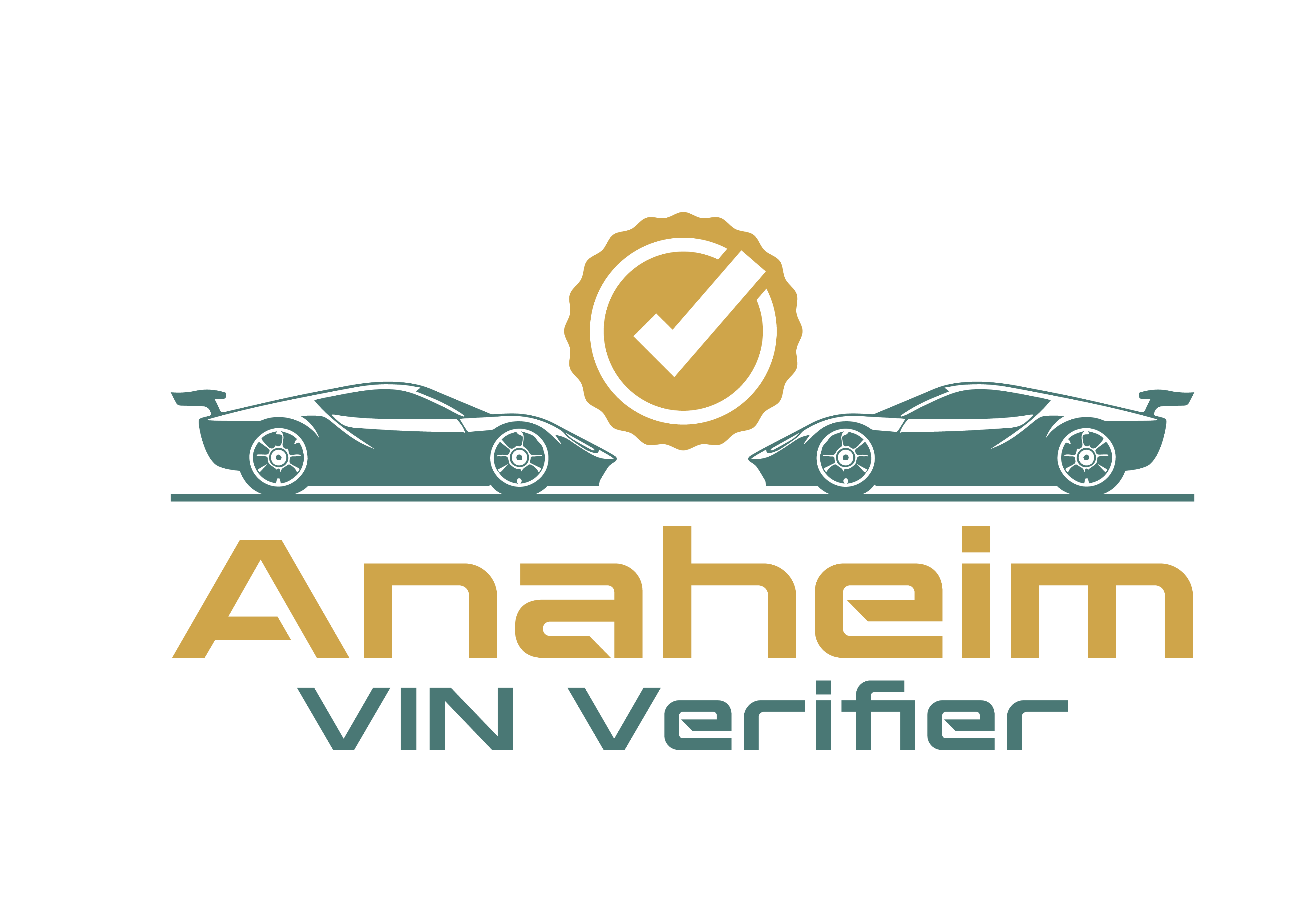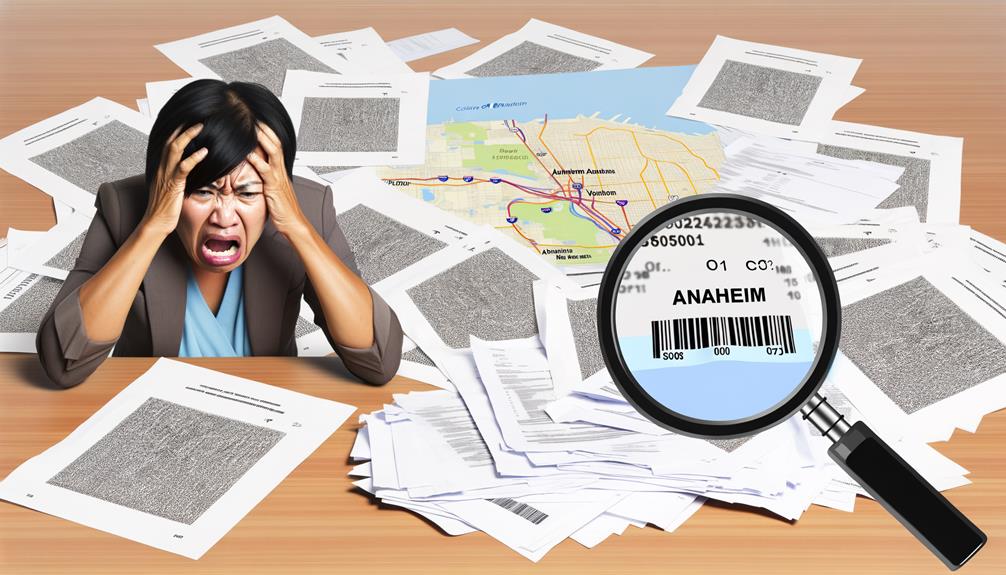When you're tackling the task of using a VIN verifier in Anaheim, you might think it's straightforward, but some common mistakes can trip you up. First off, overlooking the accuracy of the VIN can set you back right from the start. It's essential you double-check every digit, as a single error can lead to significant discrepancies in vehicle records. Also, don't just go with any verifier—ensure they're properly licensed. If you're wondering what else could go wrong, consider the repercussions of missing crucial documentation or choosing a verifier unfamiliar with your type of vehicle. What other pitfalls should you be on the lookout for?
Overlooking VIN Accuracy
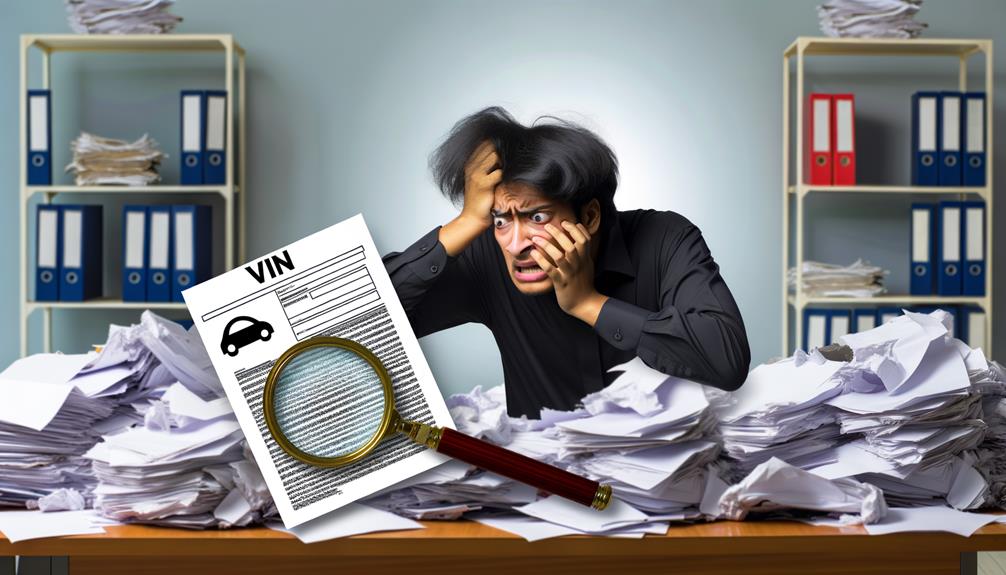
When verifying a vehicle's VIN, overlooking its accuracy can lead to serious registration complications. You'd think it'd be straightforward, but ensuring the VIN on your car matches exactly with your documents is crucial. This isn't just about filling out forms; it's about safeguarding your freedom to drive. Imagine this: you're all set to hit the road, but a mismatch in VIN accuracy holds you back. You can't afford delays, fines, or, worse, being stuck without a legal ride. That's where VIN verifiers come into play. They aren't just ticking boxes; they're your frontline defense against potential hassles. They ensure every VIN verification done is thorough, leaving no room for errors that would chain you down. The process demands attention to detail. Additionally, it's vital to verify the emissions label as part of the comprehensive inspection to ensure compliance with California's regulations. VIN verifiers meticulously document the VIN's location, cross-referencing and updating records against the DMV database regularly. This isn't busywork; it's a crucial step to keep you moving freely, without legal snags. Remember, an inaccurate VIN could mean you're inadvertently in possession of a stolen vehicle or facing discrepancies in ownership. Always make sure your VIN verification is done right, keeping your path to freedom clear
Ignoring Verification Sources
After ensuring the accuracy of your VIN, don't overlook the importance of who performs the verification. In California, only licensed verifiers are authorized to conduct this critical inspection, which means selecting the right source isn't just a matter of preference—it's a requirement. Choosing an unlicensed or non-certified VIN verifier can lead to not only inaccurate verifications but also potential legal issues. It's crucial to ensure that your VIN verification complies with California DMV regulations to avoid any complications during the vehicle registration process. Services like the California Highway Patrol also offer VIN verification, providing an additional layer of trust and assurance in the process.
You've got options—don't ignore them. Utilizing services like mobile VIN verifiers can save you time and potentially reduce costs. These professionals come to you, making it a hassle-free experience that aligns with your need for freedom and flexibility. However, remember, it's not just about convenience. Ensure that these mobile verifiers are certified and reputable to avoid falling victim to fraud or errors that could set back your registration process
Skimping on Verifier Credentials
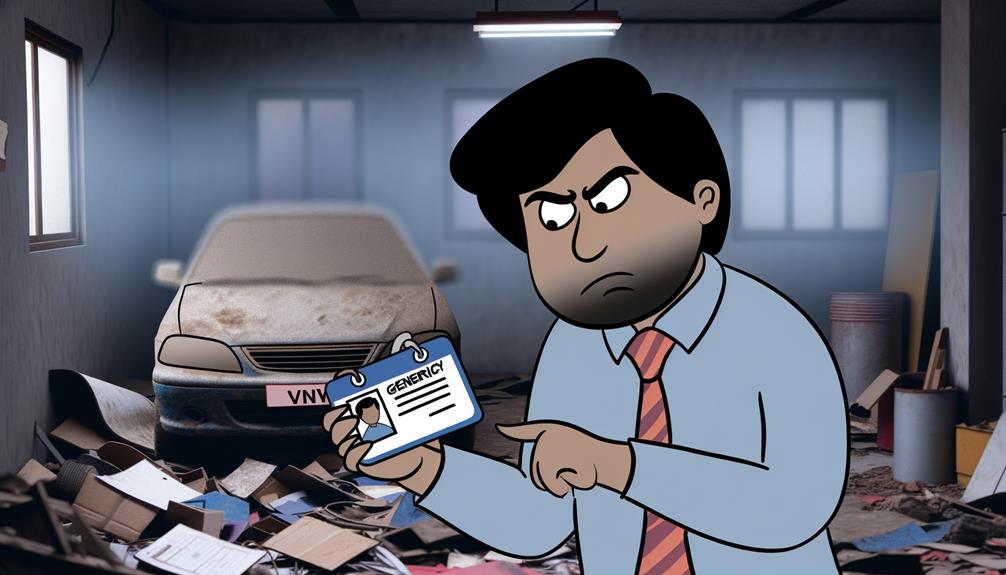
Ensuring your VIN verifier has the right credentials isn't just a step in the process; it's a safeguard against potential errors and legal issues. When you're eager to get your vehicle on the road, it's tempting to speed through the VIN verification process. However, skimping on verifier credentials can backfire dramatically. Always check that your verifier holds a valid Vehicle Verifiers Permit. This isn't just bureaucratic red tape; it's your assurance that they're authorized to inspect vehicles in California.
Moreover, make sure they're bonded. This isn't just about ticking boxes; it's about protecting yourself from potential fraud or negligence. You wouldn't want to face delays in registration or, worse, legal headaches because someone didn't do their job right.
Additionally, don't overlook the importance of specialized training and familiarity with the California Vehicle Code. These aren't just perks; they are essential for accurate and compliant inspections. A verifier well-versed in regulations and equipped with the latest training can spot issues you might miss, ensuring your freedom to drive without unforeseen troubles. So, take the time to confirm these credentials; it's worth the effort.
Misunderstanding VIN Verification Scope
While verifying the credentials of your VIN verifier is key, it's equally important to understand the specific limitations of what they can legally inspect. Don't fall into the trap of assuming that any vehicle can go through VIN verification. Recognize that this registered service has clear boundaries set by DMV regulations. For instance, if you're bringing in a vehicle from out of state or one that's not listed in the DMV database, yes, VIN verification is your next step. However, remember, vehicles like revived salvage ones, junked vehicles, or motorcycles without proper documentation are off-limits.
Moreover, vehicles manufactured in 1980 or later must have a visible Federal Safety label to qualify for VIN verification. This is non-negotiable! Also, gray market vehicles or direct imports do not qualify for this service. Always check your vehicle's origin and specifications before you bring it in for verification.
Forgetting Required Documents

Why risk unnecessary delays in your VIN verification process? When heading to your VIN verification appointment in Anaheim, remember that arriving without the required documents can severely slow things down. You've got places to be and things to do, so make sure you bring your vehicle's title, registration, and proof of identification. These are not just formalities; they are your ticket to a speedy registration service.
Don't forget to check if you need additional paperwork, especially if your vehicle is older or has discrepancies. You'll need details like the license plate number, state of registration, and the specific location of the VIN on the vehicle. For those classic or older models, documentation about the emissions label and odometer reading is crucial to meet California DMV requirements.
If you miss bringing any of these, you're not only looking at a potential rescheduling but also extra costs. It's all about preparing ahead. Gather all relevant documents in advance and double-check them. This isn't just about compliance—it's about ensuring your freedom to drive without bureaucratic hold-ups. Stay prepared, stay ahead, and keep your VIN verification on track.
Neglecting Legal Compliance
Neglecting legal compliance in the VIN verification process isn't just a minor oversight; it's a direct path to serious legal trouble. When you skip over the necessary steps dictated by California Vehicle Code sections CVC §675.5, 675.6, and Title 13 regulations, you're playing with fire. It's not about filling out paperwork for the sake of bureaucracy; it's about safeguarding your freedom from unforeseen legal binds.
As a VIN verifier, sticking to the REG 31 form requirements isn't optional. Each detail you document and submit to the DMV ensures that the VIN and the vehicle's title align, protecting you from accusations of fraud and potential involvement in vehicle theft. This is especially critical in situations like lien sales, where the stakes are high and the room for error is minute.
Failing to maintain your licensing and certifications can lead to severe penalties. Imagine losing your Vehicle Verifiers Permit or getting slapped with fines—such disruptions can derail your operations and tarnish your reputation. To keep your business running smoothly and uphold the integrity of the VIN verification process, always stay within the bounds of legal compliance. This isn't just about following rules—it's about ensuring your professional freedom remains unchallenged.
Overlooking Inspection Limitations
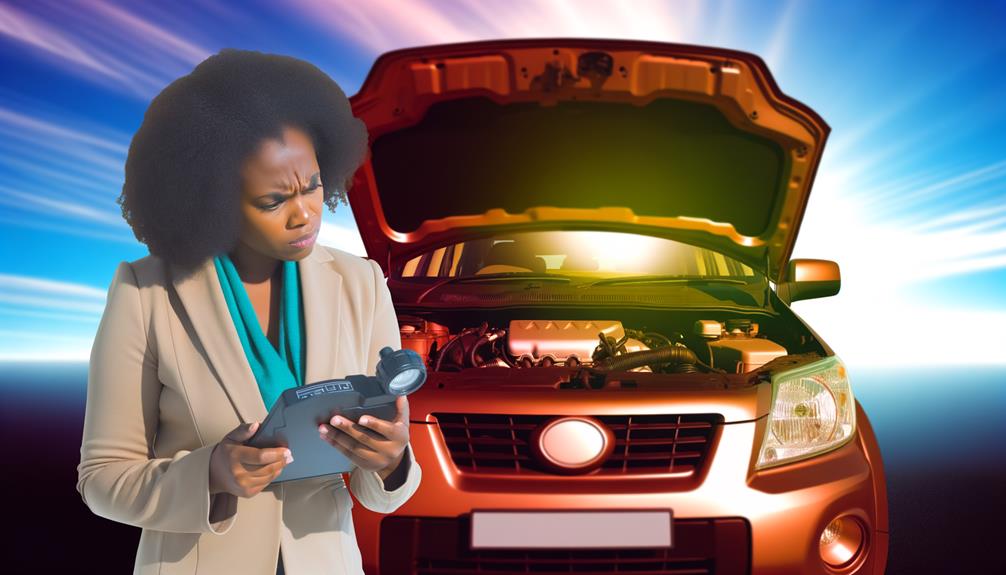
After addressing the importance of legal compliance, it's equally important to focus on the specific limitations associated with VIN inspections. You don't want to hit a roadblock when you're almost done with your vehicle's documentation. Being aware of inspection limitations is crucial to avoid unnecessary registration issues.
Firstly, if you're dealing with a revived salvage vehicle, remember that licensed verifiers in California can't inspect these. Ignoring this could lead you into a frustrating loop of registration problems. Likewise, any junked vehicles you might be considering are off the table for VIN verification. This isn't just a minor hurdle; it's a complete stop sign.
Additionally, vehicles manufactured post-1980 must have a Federal Safety label to qualify for verification. Don't overlook this; missing it can delay your entire registration process. For motorcycle enthusiasts, ensure your ride is already in the DMV database and has the requisite documentation. Without these, VIN verification won't be possible, complicating your registration.
Lastly, gray market or direct import vehicles also fall outside the scope of licensed verifiers. Knowing these boundaries upfront will save you from futile attempts and help maintain your freedom to navigate registration smoothly.
Choosing Inexperienced Verifiers
Selecting a VIN verifier without adequate experience can lead to a host of complications, from incorrect documentation to potential legal issues with the California DMV. When you're in the market for VIN verification, you're naturally looking for a smooth, hassle-free experience that keeps your freedom to operate your vehicle uninterrupted. Unfortunately, inexperienced verifiers might not be up to this task.
Inexperienced verifiers often lack the detailed knowledge required for different types of vehicles, such as gray market or revived salvage vehicles. This lack of expertise can result in failed inspections, causing frustrating delays in your registration process. Moreover, these verifiers might miss critical details, like the proper VIN placement or discrepancies in supporting documents. Such oversights can further tangle your dealings with the California DMV, leading to more red tape and potential legal headaches.
To avoid these pitfalls, ensure your chosen verifier is not only experienced but also licensed and compliant with the California Vehicle Code. This verification safeguards the integrity of your VIN verification process, protecting you from the risk of fraud and ensuring that your vehicle meets all necessary legal standards. Remember, the right verifier makes all the difference in keeping your life on the road smooth and free from unnecessary obstacles.
Missing Out on Mobile Services
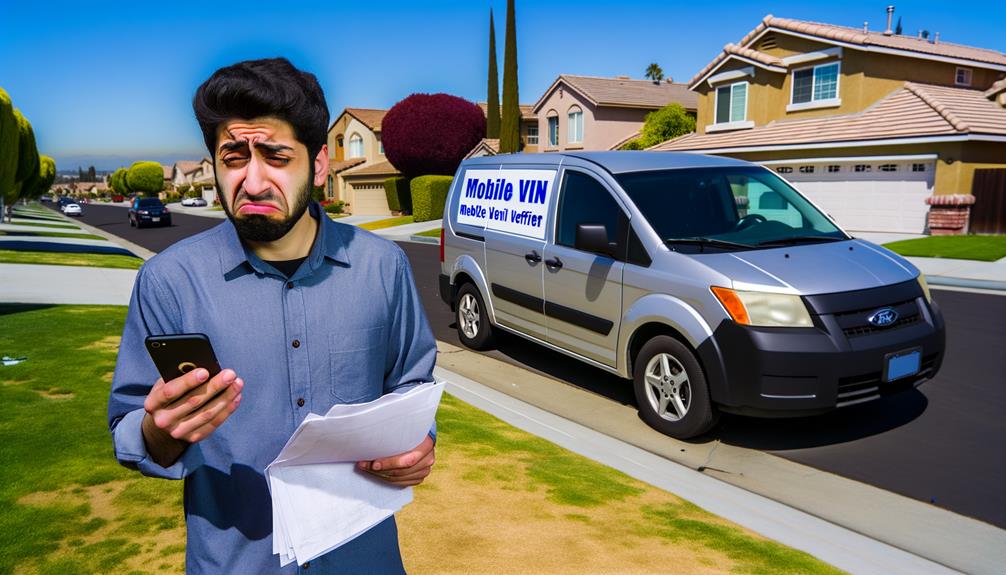
Many vehicle owners in Anaheim overlook the benefits of mobile VIN verification services. You're missing out on a prime opportunity to streamline your registration process without stepping out of your driveway. Mobile VIN verification brings the service to your doorstep, catering to your busy schedule and freeing up your time for other activities you love.
Imagine not having to disrupt your day to meet California DMV requirements. Mobile services adapt to your lifestyle, providing verification at your home, office, or any location you choose. This flexibility is crucial, especially for out-of-state vehicles that require immediate attention to avoid registration delays.
While AAA offers free VIN verification, it's essential to remember that these are typically not mobile. You could be tying yourself down to their timing and locations, which might not always work for you. By not opting for mobile options, you risk facing unnecessary delays. Local DMV centers and other fixed verification points often have long wait times and limited appointment slots.
Investing in mobile VIN verification means investing in your freedom. Don't let the convenience slip through your fingers; it's worth every penny to keep your life moving without a hitch.
Disregarding Verification Costs
While mobile VIN verification services offer unmatched convenience, it's also important to consider the costs involved. You might think you're saving time by choosing mobile verifiers, but overlooking the price differences between options can lead to unexpected expenses. In Anaheim, mobile services range from $67 to $147, while heading to the DMV or CHP could mean getting the verification done for free, provided you've got your paperwork sorted out beforehand.
If you're a AAA member, you're in luck—VIN verification comes at no extra charge. However, if you're not, remember that AAA limits its free services to certain types of vehicles. Also, don't forget that opting for the quickest mobile verification at your location could add about $35 to your bill.
Moreover, it's crucial to realize that mobile verifiers have their limitations—they can't inspect salvage vehicles, for instance. This could mean a wasted trip and money if your vehicle falls into that category. Plus, any travel fees the verifier charges, which vary by distance and service scope, will impact how much you end up paying. Always budget wisely to keep your freedom from turning into frustration.
